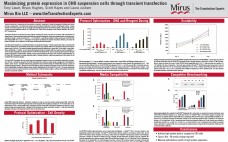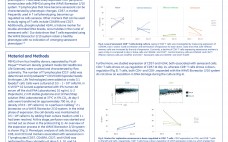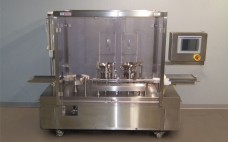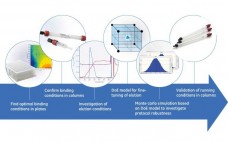In cell culture-based vaccine production, scale-up of adherent cells is challenging. This study shows a process for scaling up adherent Vero cells from static cell factories to influenza production at 50 L scale using WAVE Bioreactorâ„¢ systems and ReadyToProcess singleuse equipment. Vero cells were grown to high cell density on Cytodex microcarriers in 10 L working volume. The cells were detached with trypsin and used to seed a 50 L production culture with the same microcarrier concentration. The cells were allowed to reattach and grow on the new microcarriers in a larger Cellbagâ„¢ bioreactor chamber. Cells were subsequently infected with influenza virus. The results show a repeatable scaleup procedure.
Sponsored Content
Maximizing Protein Expression in CHO Suspension Cells Through Transient Transfection
Transient transfection in mammalian cell lines provides an avenue for researchers to bridge the development bottleneck and shorten the time to usable protein. The method also maintains post translational modifications crucial for biotherapeutic function. Chinese Hamster Ovary (CHO) suspension cells are especially suited for high yield production of recombinant proteins, despite being refractory to commonly used transfection methods (e.g. 25kDa linear PEI). Mirus Bio has developed a more effective alternative, the TransIT-PRO® Transfection Kit. Transfection efficiencies are affected by many…
Purification of Oligonucleotides on TOYOPEARL GigaCap® Q-650S
TOYOPEARL GigaCap Q-650S is capable of delivering oligonucleotides of comparable purity and slightly higher process yields under the same operating conditions to those seen with resins requiring higher operating pressures. This capability allows chromatographers to purify oligonucleotides without the added expense of purchasing high pressure manufacturing equipment.
Overview of a Scale-Up of a Cell-Based Influenza Virus Production Process
The aim of this white paper is to demonstrate how GE Healthcare Life Sciences single-use products can be applied in the field of vaccine manufacturing. A brief discussion around modern vaccine processes is followed by a case study showing the scale-up of upstream and downstream processes for the production of a cell based live attenuated influenza virus using single-use ReadyToProcess technology. Single-use equipment enables quick changeover between products, minimizes risk for cross-contamination between batches, and reduces the need for cleaning and validation operations.
T Cells Expanded in the WAVE Bioreactor™ 2/10 System Maintain a Healthy Phenotype
T cell immunotherapy often requires the expansion of a small select starting population in vitro. To achieve therapeutic doses, this population is required to undergo multiple and rapid rounds of replication. Rapid T cell expansion raises the possibility of inducing senescence or an aged phenotype, both of which are detrimental to the recipient patient. The WAVE BioreactorTM System is often used for the final expansion phase before patient infusion and we have analysed the aging characteristics of T cells that…
Small Scale Automated Vial Filling
For small scale vial filling operations the FLT features an ideal platform. With the ability to automatically fill, stopper, and cap most common vials with minimal size parts and a user friendly control system the FLT has the features big machine features in a compact package. The mobile cart and standard utility requirements the FLT can be utilized by several different users in a lab situation. The FLT can be used with a peristaltic pump, or a rolling diaphragm dosing system, both of which are available as a single use option from the Bosch PreVAS dosing system family. Utilizing an automated system reduces filling error and product loss in comparison to manual filling operations, reduced operator fatigue and improved productivity without adding headcount.
Are You Into Biosimilars?
Learn about GE Healthcare Life Sciences’ aim to help bioprocessing teams map out the optimal plan to transform a biosimilars project idea into result, with greater flexibility and confidence and with reduced time and cost.
Transfer of Hepatic Progenitor Stem Cell Culture Process from Multitray Stacks to the Integrity® Xpansion™ Multiplate Bioreactor
Scale-up a stem cell process may be challenging: small variations in physicochemical parameters (surface characteristics, pH and dissolved oxygen) can heavily impact stem cell growth and behavior. The Integrity® Xpansionâ„¢ multiplate bioreactors have been designed to enable an easy transfer from multiple-tray stacks process by offering the same cell growth environment: stacked hydrophylized polystyrene plates in a compact and closed system (from 10 to 200 plates per bioreactor equivalent respectively to 6120cm² and 122400cm²). As there is no headspace between…
Polishing of Monoclonal Antibodies Using Captoâ„¢ MMC ImpRes in Bind and Elute Mode
GE Healthcare Life Sciences MAb purification toolbox employs protein A chromatography media (resins) such as MabSelect SuReâ„¢ or MabSelect SuRe LX, in the capture step. After the initial protein A step, there is a range of options for intermediate and polishing purification steps. One option is Capto MMC ImpRes, a new chromatographic medium based on a multimodal cation exchange ligand. This work describes a rapid procedure to establish a robust second step in bind/elute mode for the purification of a…
A Short History of Cell Culture Media and the Use of Insulin
A surprising history of cell culture media and the use of insulin, outlining the basic developments behind growing mammalian cells.
It will take you on a journey from the late 1800 where organ tissues were kept in balanced salt solutions -BSS- and later PBS, until the early 50’s synthetic media, over chick embryo extract and Eagle’s Minimal Essential Medium (MEM) or its modification by Dulbecco (DMEM). Finally describing insulin mimicking growth factors.









